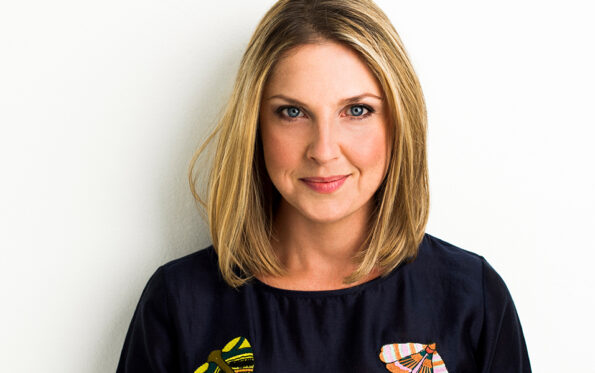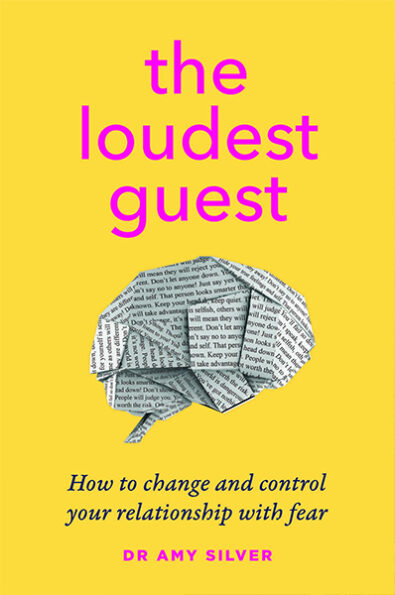In this excerpt from her new book, author and psychologist, DR AMY SILVER draws upon her extensive experience to provide a practical step-by-step guide to managing and overcoming fear and creating a more powerful you…
There are biological, evolutionary, and social reasons why our fear is triggered, we are after all simple animals. Learning how to override our fear is essential in helping us fulfil our potential. If left unchecked, fear can control everything we do. We become a bystander, commanded by the voice of fear as it triggers biochemical reactions that cause us to fight, flight or play dead. I think of fear as a guest at our party, and we are the host. We are the ones who should get to decide what to do, not fear. Even if fear is the loudest guests commanding our choices and movements, we as the host must elevate into the position of control.
To gain control we must first understand more about our current relationship with fear. When does fear get loud for you? When is it difficult to ignore it? Understanding the way in which our body reacts to our fear voice, what our fear voice says and how it talks to us is crucial. It is easy to be self-critical of our fears, anxieties and worries or critical of ourselves for having them. If we are ashamed of our fear a natural response is to deny or ignore our fears. When we do, we lose touch with some important self-awareness cues and may end up carrying some new hard emotions such as shame and guilt.
If we approach our fear with compassion, we can change the relationship with fear so that we can turn towards it and hear its messages. Fear has wonderful things to give us, it gives us the gift of working harder and warning us of failure or rejection. But we want to learn when to listen to it and when not to. We don’t want to be blindly being controlled by it.
We all have fears, many of which keep us safe and well. Fear’s job is to warn us of danger and avoid risk. It wants us to avoid anything which would cause physical or social pain. But how much does fear interfere with our good choices? Fear wants to keep us away from discomfort but if we listen to it all the time does it steer us away from growth? Or opportunity? Does our fear of rejection, failure, exclusion, being different, having to change, being vulnerable or showing weakness limit what we could do or who we could be? And as well as limiting us from gains we could make, fear also leads to distress and feelings of anxiety or worry. We may have a fear of missing out, fear of being overlooked, fear of being seen, of speaking up, standing up or even a fear of being taken advantage of.
Fear protects us and warns us of danger, but often it gets too loud, too involved in our choices and has the power to cripple us. We experience fear of failure, fear of rejection, fear of bad things happening and fear of getting it ‘wrong’. Fear prevents us from speaking up or showing up as our best self. So, how can we quieten fear so it doesn’t control what we do?
We want to evaluate what to do in relation to our goals, not our fears. We must learn to evaluate the content so we can hear the message that the guest of fear is giving us without having to take on the drama and catastrophising. For example, we don’t need to listen to stories of the past or future that fear often uses to remind us of the dangers. We want to tune into the ‘now’ so that we can truly evaluate the action that will serve our goals. We may also want to tune into what other important voices have to say, for example, hope, excitement, joy. We can control how we move our attention around these different voices rather than listening to fear using strategies such as writing or finding ways of letting fear travel through rather than getting caught up.
Becoming more courageous is easy when we’ve decided to build a closer relationship with fear. Making sure we are in control of fear is one of the most essential skills we can practice driving our professional success (individually and as a collective). We will be able to make deeper connections, influence decisions, act quicker, create more, have more fun, opt into not away from a challenge, be calm and have more fun. We are not our fears, we are the host.
SIX STEPS TO BETTER MANAGE YOUR FEAR
Fear is designed to protect us, but sometimes it limits our impact in the world or our enjoyment of life. Fear sends us messages of avoidance. Avoidance can be useful for example when fear tells us to avoid standing too close to the edge of a cliff. However, it can sometimes tell us to avoid things that would help us grow. For example fear can tell us to avoid creating a deep relationship with someone, avoid failure by not even trying, avoid showing our true feelings in case people reject us, avoid saying no to someone in case they think badly of us, and so on! Do we always need to listen to our fears?
Fear can also tell us to defend and attack if it feels we are vulnerable. It can shout messages of defence, so we block or deny others’ even attack them before they expose us. Again, sometimes this is helpful, but is it always? And fear can also show up as pervasive worry. The type of rumination that causes us to be distracted from our now as we focus on the past or the future. It can be extra cognitive load that we carry with no need. It can make decisions harder and distress greater. Here are the six steps to better manage your fear:
1: Recognition
This is the first step of any self-development or self-control process. If we can’t recognise what is going on, we are not in a position to consciously change anything because it is all happening without our awareness and without our consent. Recognising where and why fear happens for us helps us see patterns. We can get closer to understanding our fear, how and where it dominates our thoughts, our feelings and our behaviours.
2: Self-Compassion
There are very biological systems at work here. We are threat seeking machines. Sometimes we are searching for physical danger, and sometimes social dangers such as being thought of badly or being rejected. Our fear is activated automatically and so we must learn how to soothe the system through self-compassion.
3: Separation
Sometimes fear or worry is so loud it doesn’t feel like there is any choice for us, we must listen and do as it tells us. However what fear says is not always what serves us best. Think of fear as a guest at your party, you are the host. You get to decide what serves you best, not fear, even if it is the loudest guest.
4: Evaluation
From this host perspective, we can truly evaluate what fear is saying. Sometimes it will be true but sometimes it will not, sometimes helpful, sometimes not. Evaluating it clearly is key and this is easiest with a pen and paper. Ask yourself the questions — is this true? Is this helpful? And what is the real message underneath this fear once we’ve taken away all the drama?
5: Decision
What decision do we want to make in this moment, or in our lives? What if we were able to control fear, what would be possible? Are we limiting our achievements or our happiness by letting fear get in the way and if so, what would be the goals that we could be making to strive towards our full potential? When we get to this time next year, what would you like to be different about your relationship with fear or the control it has over you and what you achieve?
6: Experiment
Moving beyond fear requires safe and gradual experiments. By deliberately setting micro movements towards your goal without listening to our guest of fear when it wants us to avoid or attack. Show the guest fear (and yourself!) that you can tolerate a little discomfort as you move beyond fear in a safe way. If you are truly stepping up, showing up and speaking up for your best version of you, you will always have the opportunity to meet new fears. Keep going!


Dr Amy Silver is a psychologist, speaker and author on the management of our emotions for high performance through courage and courageous conversations. She is also the founder of The Courage Club, the place to outgrow your fears. Her latest book, The Loudest Guest: How To Change And Control Your Relationship With Fear by Dr Amy Silver (Major Street Publishing $29.95rrp) is available in bookshops and on Amazon and Booktopia. For more info visit www.DrAmySilver.com for more information
For the full article grab the April 2021 issue of MAXIM Australia from newsagents and convenience locations. Subscribe here.




























